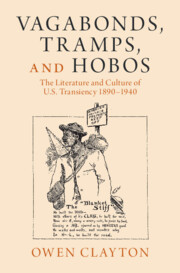Book contents
- Vagabonds, Tramps, and Hobos
- Cambridge Studies in American Literature and Culture
- Vagabonds, Tramps, and Hobos
- Copyright page
- Dedication
- Contents
- Figures
- Acknowledgements
- Part I Context
- Introduction
- 1 From Tramp to Hobo
- Part II The Vagabond and the Tramp
- Part III The Hobo Transformed
- Conclusion: The End of the Road? Transiency beyond the Hobo
- Notes
- Bibliography
- Index
- Recent books in this series (continued from page ii)
Introduction
Hobohemia and the Literary Imperative
from Part I - Context
Published online by Cambridge University Press: 27 July 2023
- Vagabonds, Tramps, and Hobos
- Cambridge Studies in American Literature and Culture
- Vagabonds, Tramps, and Hobos
- Copyright page
- Dedication
- Contents
- Figures
- Acknowledgements
- Part I Context
- Introduction
- 1 From Tramp to Hobo
- Part II The Vagabond and the Tramp
- Part III The Hobo Transformed
- Conclusion: The End of the Road? Transiency beyond the Hobo
- Notes
- Bibliography
- Index
- Recent books in this series (continued from page ii)
Summary
Transients created what was arguably the first counterculture in the modern United States, known as ‘hobohemia’. This Introduction argues that hobohemia was a literary subculture, the fruits of which included fiction, poetry, autobiography, sociology, journalism, and popular music, including works produced by women and African-Americans. The material examined by this book, much of which has been forgotten or neglected, demonstrates that hobos were not the all-American, white, straight, male hyper-individualists that they have been seen as by much twentieth-century popular history. As well as laying out the argument and structure of the book, the Introduction argues that Hobohemia was a subculture that privileged storytelling, and that the popular genre of hobo memoir emphasises drift as a key aspect of the transient experience.
Keywords
- Type
- Chapter
- Information
- Vagabonds, Tramps, and HobosThe Literature and Culture of U.S. Transiency 1890–1940, pp. 3 - 23Publisher: Cambridge University PressPrint publication year: 2023

